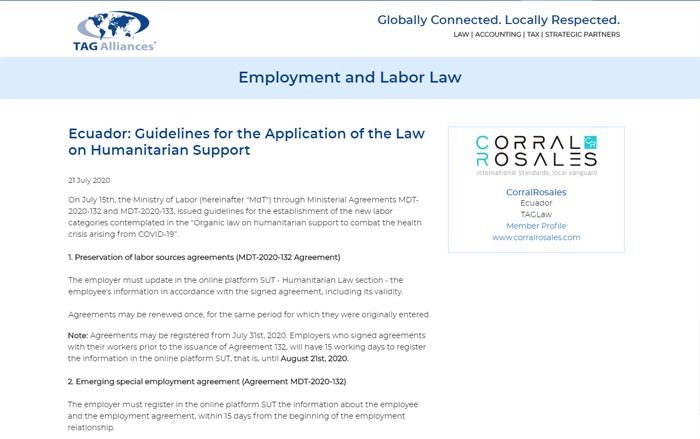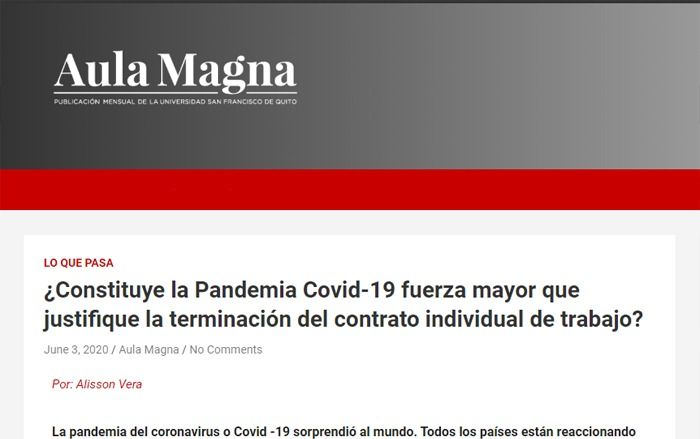Coronavirus or Covid-19 pandemic shocked the world. All countries are reacting with various measures to mitigate the multiple consequences being generated in all scopes.
After health concerns, the economic impact is a great concern, since in addition to the closing of companies and the consequent fall in the economy, the loss of jobs will condemn a significant part of the workforce to unemployment.
The International Labor Organization ILO, in its publication “COVID-19 and the world of work: Implications and Responses[1]”, provided a preliminary assessment of the possible impact of Covid-19 on the world of work and proposed a set of measures to mitigate these repercussions. There is no doubt that this situation affects workers and employers worldwide, since there are sectors in which there is no production nor incomes, but they still have expenses (rent, suppliers, payroll, social security, etc.). Therefore, dialogue is the best tool to achieve an agreement.
On March 16, 2020, the State of Exception was decreed in Ecuador to mitigate the spread of Covid-19. Among other measures, the closing of certain sectors and social isolation were ordered. Priority and strategic industries such as health, food, basic services, telecommunications, among others are the only ones authorized to provide services in person.
Due to this situation, the Ministry of Labor, in order to comply with the restrictions ordered by the authority and maintain jobs in the country, has issued several agreements that encouraged companies to implement, to the extend possible: emergency teleworking, modifying workday, establishing vacation time, implementing the temporary suspension of work, and has even opened the possibility for employers and workers to reach agreements, taking into consideration the economic situation of the company, as long as their labor rights are not infringed.
Despite the efforts of the labor authorities, it is not possible to apply temporary measures to maintain employment contracts in all scenarios, and there are cases in which employers find it necessary to terminate employment contracts due to the effects of the Covid-19.
In this regard, section 6 of article 169 of the Labor Code, which contains the grounds for terminating the employment relationship, provides:
“Art. 169.- Causes for the termination of the individual contract.- The individual employment contract ends:… 6) By unforeseen circumstances or force majeure that makes the work impossible, such as fire, earthquake, storm, explosion, plagues of the field, war and, in general, any other extraordinary event that the contractors could not foresee or that they anticipated, they could not avoid;… (I did the underlining.) ”
Despite the fact that, on a doctrinal level, there is a difference between unforeseen circumstances and force majeure, since the term “unforeseen circumstances” should be reserved for the acts of nature, while “force majeure” refers to the events caused by man, most legal and treaty systems agree that the effects are the same. Ecuadorian regulations do not distinguish between those two[2]. Thus, the definition of force majeure is the same as that of unforeseen circumstances and is contemplated in article 30 of the Civil Code that establishes: “(…) It is called force majeure or unforeseen circumstances, the unforeseen event that it is not possible to resist.” Its effect is the exoneration of the debtor’s responsibilities[3].
Therefore, it is important to identify the fact that constitutes force majeure, since based on this, the analysis of the effects it may have on the employment relationship will be carried out. On the other hand, for force majeure to apply, as an exemption from labor responsibility, the doctrine and jurisprudence[4] establish that the following elements are necessary:
- Non-imputable: The constitutive act of force majeure cannot, nor should it be attributable to the party that alleges it; that is, for an event to be considered force majeure, the employer cannot have caused it, whether through fault, fraud or negligence.
- Unpredictability: that the fact could not have been foreseen within the ordinary calculations; and that, although it has been foreseen, it is inevitable.
In this regard, the Supreme Court of Justice – today the National Court of Justice – has said:
“There is no doubt that the background of the closing of the company’s activities was due to the fault of the employer, for the lack of payment to the treasury. Therefore, there is no logical and legal basis for the closing of the company due to force majeure, since the situation of force majeure defined in Article 30 of the Civil Code is not presented in the case, because the closing situation of the company was foreseeable by virtue of the delay of the payments before the State. Judicial Gazette. CIII year. Series XVII. No. 8. Page 2533; Quito, May 29, 2001. ((I did the underlining.)”
In this case, the elements detailed above are not configured, since the supposed fact of force majeure; that is, the closing of the establishment was attributable to the employer for not complying with a legal obligation. Likewise, the employer could foresee the closing of the establishment, since it was one of the sanctions provided by law as a consequence of its acts.
- Irresistibility: “that could not have been avoided” as expressed by Coustasse[5], refers to the conduct of those who invoke the force majeure in the face of the event itself, and consists of the mechanisms used to mitigate the unforeseen event tending to avoid its harmful effects.
- Causation: that the damages caused are a consequence of the unforeseen event that is constituted as a unforeseen circumstance and not of another factor.
- Impossibility to work. – For Alberto G Spota[6]: “The unforeseen circumstance means the legal or physical impossibility of executing the due provision (…)”. This element must be configured with irresistibility, since the impossibility of rendering the service must be linked to the impossibility to overcome the harmful effects of force majeure or unforeseen circumstance alleged.
For this analysis, it is necessary to consider that, to mitigate the effects of Covid-19 on industries, the Labor Code contemplates figures such as the temporary suspension of work activities – maintaining the payment of workers’ compensation – and cease of activities by the employer. Therefore, the impossibility to work as a cause to end the employment relation should not be temporary, since, if it were temporary, it could be facing a suspension of activities or possible cease of activities by the employer and not to a termination of the employment relation.
The termination of the employment relation, under this cause, does not constitute untimely dismissal, since the dismissal is the termination of the employment relation by unilateral decision of the employer. In this case, the breakdown of the relation occurs due to the damaging effects of force majeure – events beyond the control of the employer. In this sense, Dr. Marcucci[7] states that the effect of the unforeseen circumstance and force majeure “(…) when they are actually proven in the labor field cause the contract to cease due to the absolute impossibility of continuing to provide the service and without any of the parties taking responsibility for it. Both are victims of force majeure (…) But neither of the two contractors is guilty of the misfortune of their former counterpart, nor therefore is forced to compensate (…) ”
Therefore, although the Covid-19 pandemic, by its nature meets the requirements of being non-imputable and unpredictable, its application as a cause for termination of the employment relation, and therefore, the exemption from the payment of compensation, cannot be applied in a generalized way based on the sole existence of the pandemic (Covid-19), because despite the fact that many industries reflect losses and liquidity problems, as a consequence of Covid-19, this does not necessarily mean that work is permanently impossible or that the effects have the necessary weight for the termination of the employment relation. It is imperative to carefully analyze the harmful effects of each case, to verify if the other three elements – irresistibility, causation and impossibility to work– are configured to justify the Termination of the employment relation for this cause: “force majeure or unforeseen circumstances make impossible to work”.
If you want to read this article in Spanish, click here
[1] Published March 18, 2020 .- https://www.ilo.org/wcmsp5/groups/public/—dgreports/—dcomm/documents/briefingnote/wcms_739158.pdf
[3] This effect has been contextualized by the Supreme Court of Justice, today the National Court of Justice: Judicial Gazette. CVIII year. Series XVIII, No. 4. Page 1434. (Quito, February 22, 2007); Judicial Gazette. CIV year. Series XVII. No. 11. Page 3395. (Quito, November 12, 2002); Trial N ° 228-2007-Ex Third Civil, Mercantile and Family Division. (Quito, November 5, 2009.
[4] National Court of Justice, Specialized Labor Division, Trial No. 0027-2018. (Quito, May 14, 2019); National Court of Justice, Specialized Labor Division, Trial No. 0026-2018. (Quito, February 4, 2019); National Court of Justice, Specialized Labor Chamber, Trial No. 1948-2015. (Quito, June 22, 2017)
[5] El Caso Fortuito ante el Derecho Civil, 1958 p. 114
[6] Instituciones del Derecho Civil, Contratos, volumen III, 1975, p. 538
[7] Panorama Contextualizado del Derecho Laboral Sustancial Colombiano, Marcucci Cesar, 2005, p.120










